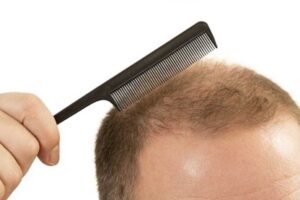5 Months After Hair Transplant No Density
Treatment Options for Male Hair Loss at Age 25
April 19, 2023
Rhinoplasty After 20 Years – The Long-Term Impact
June 20, 2023Waiting for the hair to grow after a hair transplant surgery can be a nerve-wracking experience. As the months pass, you eagerly await new hair to grow.
What happens if you get no density 5 months after hair transplant?
It will undoubtedly be frustrating and scary, leaving most patients fearful and worried.
However, it is not unusual to have a slow start in the hair growth process after a transplant.
As Dr. Vinod Vij, an acclaimed plastic surgeon in Mumbai, says, “You will have to wait for around a year to see the result of your hair transplant. It takes time for new hair to grow, especially after hair restoration.”
Unfortunately, the result can take longer for some patients, and the growth may still be disappointing even after several months.
Dr. Vinod Vij, an expert in hair transplant in Mumbai, explains that several reasons can contribute to slow or lacklustre growth after a hair transplant surgery.
These can include the patient’s overall health, the type of transplant procedure used, and even the individual’s age.
Furthermore, genetics and lifestyle choices can also affect hair growth speed and quality after a transplant.
Despite these challenges, there is still hope for those who have experienced no density five months after their hair transplant.
With proper care and patience, it is possible to see an improvement in the growth and density of your hair.
In the meantime, it is essential to maintain a positive outlook and to trust the process, as the results can be truly remarkable in the long run.
Suppose you feel anxious about the lack of density five months after your hair transplant. You can visit Dr. Vinod Vij for hair transplant counselling in Mumbai at Clinique Asthetica.
He can guide you through this journey and help you achieve high density of hair with his expertise and experience.
What can be the reason behind low density after 5 months of hair transplant?
Several factors can contribute to low density after a hair transplant, which include the following:
Shock loss: This is a temporary loss of hair that can occur after a transplant as the body adjusts to the new hair follicles. This can cause a drop in density, but the hair typically regrows within a few months.
Poor growth: This can be due to various factors, including genetics, age, health issues, and the type of transplant procedure used. Some hair transplant techniques may not produce as much growth as others.
Improper care: During the recovery, you must follow your hair transplant surgeon’s instructions carefully. Failure to do so can impact the growth and density of the transplanted hair.
Medical conditions: Certain conditions, such as hormonal imbalances, autoimmune disorders, and nutrient deficiencies, can affect hair growth.
Medications: Some medications can also impact density after a transplant.
It is impossible to achieve total density immediately after a hair transplant procedure. Hair growth does take time, and some patients may experience a slow start in the hair growth process.
What to do if there is no density after 5 months after hair transplant?
Even 5 months after hair transplant, no density troubles you; it is best to consult a hair transplant specialist to determine the cause and find a solution.
Some potential steps to combat this issue include:
Waiting: Be patient and give the hair transplant time to take hold. It can take up to a year for the full effects of a hair transplant to be seen.
Monitoring hair growth: Your hair transplant specialist can monitor your hair growth and determine if there are any issues affecting the growth and density of your transplanted hair.
Reviewing the procedure: In some cases, the issue is related to the type of hair transplant procedure used. Your doctor can assess the problem and make recommendations if necessary.
Seeking medical treatment: If underlying medical conditions affect your hair growth, your hair transplant surgeon may recommend medical treatment.
Following aftercare instructions: Proper aftercare is crucial for ensuring that your hair transplant is successful.
Tips to boost density after hair transplant
Steps to stimulate hair growth and density:
Keep the scalp clean: It is crucial to keep the scalp clean to prevent infection and promote healthy hair growth. Follow the aftercare instructions properly.
Avoid excessive washing: Over washing can strip the scalp of its natural oils and dry the skin. Wash your hair no more than 2-3 times per week.
Avoid heat styling: Excessive heat can damage the hair and slow the growth process. It is in your best interest to avoid using blow dryers, flat irons, and other heat-styling tools.
Refrain from excessive hair pulling: Constant pulling, brushing, or styling can stress the transplanted hair and slow down growth. So be gentle when brushing or styling.
Take proper nutrition: A healthy diet rich in vitamins and minerals can support hair growth and improve hair density. Focus on eating a diet rich in vitamins A, C, D, and E, iron, zinc, and biotin.
Avoid smoking and excessive alcohol: Smoking and excessive alcohol consumption can harm hair growth and density. If possible, quit smoking and limit alcohol consumption.
Keep away from sun exposure and pollution: Excessive sun exposure and pollution can damage the hair and slow down the growth process. To protect your hair, wear a hat or scarf when spending time outdoors.
Seek medical treatment: If underlying medical conditions affect your hair growth, your specialist may recommend medical treatment.
If you are concerned about hair transplant 5 months results, remember that the hair is finer and scarce around this time. In another few months, the hair will become thicker and denser.
When should you consult a hair transplant surgeon?
If you have density issues after a hair transplant, you should consult a hair transplant surgeon as soon as possible.
A hair transplant surgeon can assess your hair growth, determine the cause of the issue, and recommend a suitable course of action.
It may include waiting for more time, changing your aftercare routine, or seeking medical treatment.
Ending Note
Seek the advice of a professional hair transplant specialist if you are worried about the low density after 5 months of a hair transplant,
Dr. Vinod Vij, an acclaimed plastic surgeon in Mumbai, has extensive experience in hair transplant surgery and can provide the guidance and support you need to achieve the desired results.
At Clinique Aesthetica, Dr. Vij and his team offer a range of hair restoration options to meet each patient’s unique needs.
Contact Clinique Aesthetica, a top hair transplant hospital in Mumbai, to schedule a consultation and learn more about how they can help you achieve the look you want.
Faq’s
Hair growth usually begins around three months after a hair transplant and continues for several months. After five months, new hair should be noticeable and continue to grow thicker and fuller as the months go on. It can take up to 12 months for the full benefits of the transplant to be visible.
Patchiness at six months is usually the result of poor growth. Various factors, including poor technique, an inadequate number of grafts, poor donor hair quality, or improper post-operative care, can cause it. Speaking to a qualified hair specialist for an accurate diagnosis and treatment plan is essential.
Your hair may still be thin after your hair transplant for several reasons. The most common include a poor donor area, inadequate graft survival, poor technique, or insufficient coverage.
The transplanted hairs may take some time to fill in, as they usually take a few months to become visible.
Additionally, lifestyle changes, such as quitting smoking, reducing stress, and eating a healthy diet, can help promote hair growth.



